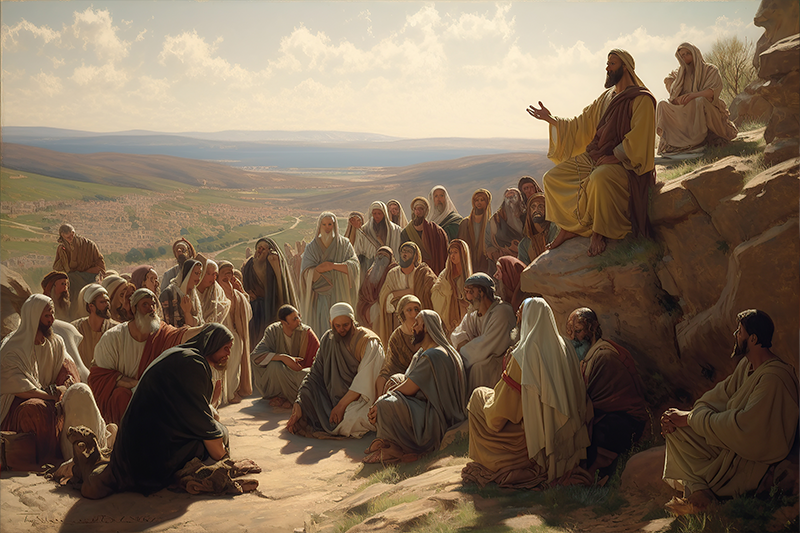As Christians, we look to the Bible for dogma as we should since the Bible is our blueprint for how to live a righteous life. Jesus’ teachings are very important for that purpose, and it clearly was always part of God’s plan for Jesus’ teachings to resonate with us now thousands of years after his death. Still, it’s important to remember that we weren’t the original recipients of those teachings. For us, Jesus is a godly figure whose impact has proven timeless, but when he lived on the Earth, he was not perceived that way.
When Jesus came to the region of Caesarea Philippi, he asked his disciples, “Who do people say the Son of Man is?” They replied, “Some say John the Baptist; others say Elijah; and still others, Jeremiah or one of the prophets.” “But what about you?” he asked. “Who do you say I am?” – Matthew 16:13-16
The people of the day recognized that Jesus was special, but to them he was nothing more than a teacher or prophet sent to deliver God’s Word. Peter was able to correctly surmise that Jesus was God in the flesh, and Jesus pointed out that Peter was only able to come to that conclusion because of divine inspiration.
As a character in the Gospels, Jesus was perceived in different ways by different people. He was the Son of God to his disciples. He was a great teacher to the masses. He was a miracle worker for those in need. He was a cult leader to the Romans and others who held power. He was a heretic in the opinions of the religious leaders of the day. It’s amazing that one man can be seen so differently by so many different people. After all, it’s not like Jesus changed how he behaved based on who he was around. He simply carried himself in such a way that people who encountered him were affected down to their core.
Coming to his hometown, he began teaching the people in their synagogue, and they were amazed. “Where did this man get this wisdom and these miraculous powers?” they asked. “Isn’t this the carpenter’s son? Isn’t his mother’s name Mary, and aren’t his brothers James, Joseph, Simon and Judas? Aren’t all his sisters with us? Where then did this man get all these things?” And they took offense at him. – Matthew 13:54-57
When he taught, even people who thought they knew him or at least knew of him were awed because his understanding of the teachings and the authority with which he taught was unlike anything they had experienced. That won him a lot of followers. It also made him a lot of enemies. Jesus did not just parrot the teachings of the day. In many ways, he turned those teachings on their heads, and that was problematic for the religious authorities of the day.
Then the chief priests and the Pharisees called a meeting of the Sanhedrin.
“What are we accomplishing?” they asked. “Here is this man performing many signs. If we let him go on like this, everyone will believe in him, and then the Romans will come and take away both our temple and our nation.”
Then one of them, named Caiaphas, who was high priest that year, spoke up, “You know nothing at all! You do not realize that it is better for you that one man die for the people than that the whole nation perish.” – John 11:45-57
The Pharisees were intimidated by Jesus. They thought he would be able to bring down their whole system. They wanted to kill him to preserve the established order. They even convinced themselves that Jesus’ death would save the nation. Ironically, though they did not understand God’s plan, they were right. Jesus’ death was necessary to save the nation and not just the nation of Israel but all nations.
Jesus’s life had an impact on the people of the day for sure, but life also impacted him just like it does for all of us, and because he was such a big and important person, he faced greater challenges. He didn’t just have to worry about avoiding the Devil’s influence on the world. He had to overcome a direct confrontation with the Devil. He wasn’t just responsible for the spiritual wellbeing of a single church. The believers of an entire nation looked to him for guidance. He didn’t just have to give up his time and comfort for the people around him. He had to sacrifice his life.
Many great characters like Moses, David, and Elijah precede Jesus in the Bible. When reading the Gospels, it becomes clear that Jesus was the culmination of the best aspects of all of them. He was a leader of lost sheep just like Moses. He was an earthly authority with a deep reverence for God just like David. He held a unique connection to God and had great prophetic insight just like Elijah. What truly set Jesus apart was that while all those other characters had weaknesses along with their strengths, Jesus had none. Even when at his lowest points, he still shined and was the perfect example of righteousness.
Jesus as God means everything to Christians, but Jesus as a man is what started the movement that eventually grew into what we now know as Christianity. He didn’t gain his followers because they all knew he was God. He gained them because, as a man, he stood so clearly for what was right that people couldn’t help but believe in him. The people heard his teachings and saw his deeds, and that was enough for them to elevate him.
The next day the great crowd that had come for the festival heard that Jesus was on his way to Jerusalem. They took palm branches and went out to meet him, shouting,
“Hosanna!”
“Blessed is he who comes in the name of the Lord!”
“Blessed is the king of Israel!” – John 12:12-13
If the people of that time who knew nothing about Jesus’ true status and purpose honored and favored him so highly, we should hold him in a vastly higher regard given that we understand that he isn’t just a teacher or prophet. He is our Savior.
Chris Lawyer







